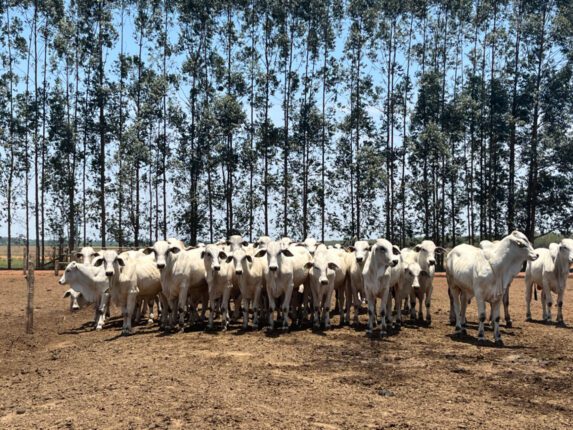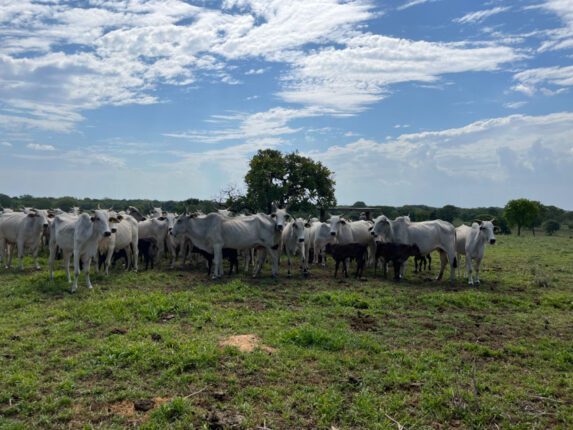-
Is the Chinese Market Hungry for Carbon-Neutral Beef?
January 11, 2024 By Peng Ren
Days before Brazilian President da Silva Feb visited China in late March 2023, China resumed its beef imports from Brazil after a temporary ban due to an earlier discovery of Mad Cow Disease. Brazil quickly bounced back as the top exporter of beef to China, a country hungry for it. With the continuous growth of China’s economy, population, urbanization, and increasing income levels, there has been an increased demand for high-protein foods. Among these, beef has become a highly sought-after delicacy. Since 2012, China has transitioned from a net exporter to a net importer of beef, primarily relying on countries like Brazil.
However, this delectable choice comes with significant environmental impacts. Beef production is an industry that emits significant amounts of greenhouse gasses (GHG). Worldwide, livestock and manure emissions contribute to 31.5% of agricultural GHG emissions (mainly methane) and 5.8% of total global climate emissions. In Brazil, livestock farming is a major contributor to the destruction of the Amazon rainforest, one of the world’s largest carbon sinks.

Cattle from ranches near Agua Boa, in the state of Mato Grosso, Brazil. The livestock sector is the primary driver of deforestation in the Brazilian Amazon and Cerrado.
Some major beef-producing countries such as Brazil, Uruguay, and Australia have begun introducing carbon-neutral beef certification, which means the producers have undertaken carbon offsetting measures. Such certifications can create new markets and offer a potential path for achieving carbon neutrality in agriculture and livestock. As the world’s top beef importer (30% of global beef imports), China adopting carbon-neutral beef labeling could expand this nascent market and be a climate mitigation gamechanger. Introducing carbon-neutral beef products into the Chinese market will need more consumer education, policy support, and investments.
Carbon Labeling in the Chinese Market
Carbon labeling for food and mutual recognition of standards in the Chinese market are gradually developing. China piloted a carbon footprint label in 2018 and since 2020, the government has been developing standards and plans for carbon labeling, particularly related to energy. Currently, carbon-labeled foods mainly include rice and miscellaneous grains, fruits and vegetables, seafood, meat, and eggs, among other categories. However, the market size for these products is relatively small, mainly targeting more high-end consumers. Existing carbon labels fall into categories such as official Chinese carbon labels, regional carbon labels, domestic third-party carbon labels, and international third-party carbon labels. Labels vary in covering carbon disclosure, carbon neutrality, or negative carbon.
Regarding the recognition of carbon labels in the Chinese market, international experience shows that traceability systems and carbon neutrality certification have been successful in Europe and some other countries. In China, domestic certification bodies such as China Environmental United Certification Center and international organizations like Carbon Trust have successfully registered with the State Administration for Market Regulation and have started offering carbon-neutral label services. This trend provides favorable support for the entry of carbon-neutral beef products into the Chinese market.
Consumer Attitudes and Willingness to Pay in China
Results from a 2022 survey of restaurant consumers in Beijing and Shanghai indicated Chinese consumers generally have a positive attitude towards carbon labeling, but, as is true in other countries, there is a gap in their willingness to pay a premium for carbon-neutral beef. Particularly among consumers in mid- to high-end restaurants, there is a disparity in the willingness to pay a premium for carbon-labeled beef, and some consumers underestimate the carbon emissions of beef. However, consumers with a high level of concern for climate change are more willing to support carbon-labeled beef and are willing to pay a premium and may even reduce or abstain from beef consumption.
Internationally, there have been some successful precedents for carbon-neutral beef. In January 2022, Uruguay successfully exported its first batch of carbon-neutral beef to Switzerland. The beef underwent the strictest international standards review by Uruguay’s carbon footprint certification and verification organization LSQA, passed carbon-neutral inspections, and entered the European market. This indicates that carbon-label certification organizations in exporting countries following international standards have gained recognition in the consumer markets of importing countries.
Recommendations and Prospects for the Chinese Market
The feasibility of introducing carbon-neutral beef products into the Chinese market is promising, but the current market situation and challenges must be fully considered. To achieve this goal, actions can be taken in four main areas:
Strengthen communication with beef-producing countries: For example, working with government, corporate, and farming stakeholders in Brazil to help them understand the pathways to achieving carbon-neutral beef. Also key are providing these stakeholders with guidelines on how to improve Brazil’s carbon-neutral product labeling system and mutual recognition standards.
Establish a cross-border traceability system for beef product supply chains: Some states in Brazil are developing state-level traceability systems for carbon-free beef, such as the Green Seal in Para State and the Green Passport in Mato Grosso State. During a recent visit to Brazil in late 2023, I learned about the imminent launch of the national-level traceability system AriAgroBrasil+Sustentável platform in Brazil. China should actively participate in discussions at the state and federal levels in Brazil to quickly establish an efficient national-level cross-border traceability system, ensuring the accuracy and transparency of agricultural product traceability information.
Strengthen outreach and education to raise consumer awareness: China needs to conduct targeted publicity and educational activities through, including media and social platforms, to increase consumer awareness of carbon-neutral beef. Well designed and concise promotional materials highlighting the environmental value of carbon neutrality could help inspire consumers’ willingness to support environmentally friendly products. China’s Ministry of Education recently mandated environmental education guidelines for schools, so there is also an opportunity for the Chinese government, universities and NGOs to help develop environmental education materials on carbon-neutral beef for schools. Thus, cultivating consumer awareness of sustainable consumption.
Provide financial support and tax incentives: The Chinese and Brazilian governments could create funding and tax incentives to guide businesses in importing carbon-labeled beef, promoting the formation and development of the carbon-neutral beef industry chain.
This article is part of a Wilson Center-Ohio State University Cultivating US and Chinese Climate Leadership on Food and Agriculture project.
Peng Ren is the program director of Overseas Investment, Trade, and the Environment at the Beijing-based Global Environmental Institute.
Sources: AHDP, Aljazeera, BCG, Beef2Live, Carbon Market Watch, Carbon Trust, China Briefing, China Dialogue, Climate Policy Initiative, Duke Fuqua, McKinsey, SCMP, Tridge, WWF
Photo credits: Courtesy of Ren Peng, November 2023.
 A Publication of the Stimson Center.
A Publication of the Stimson Center.








